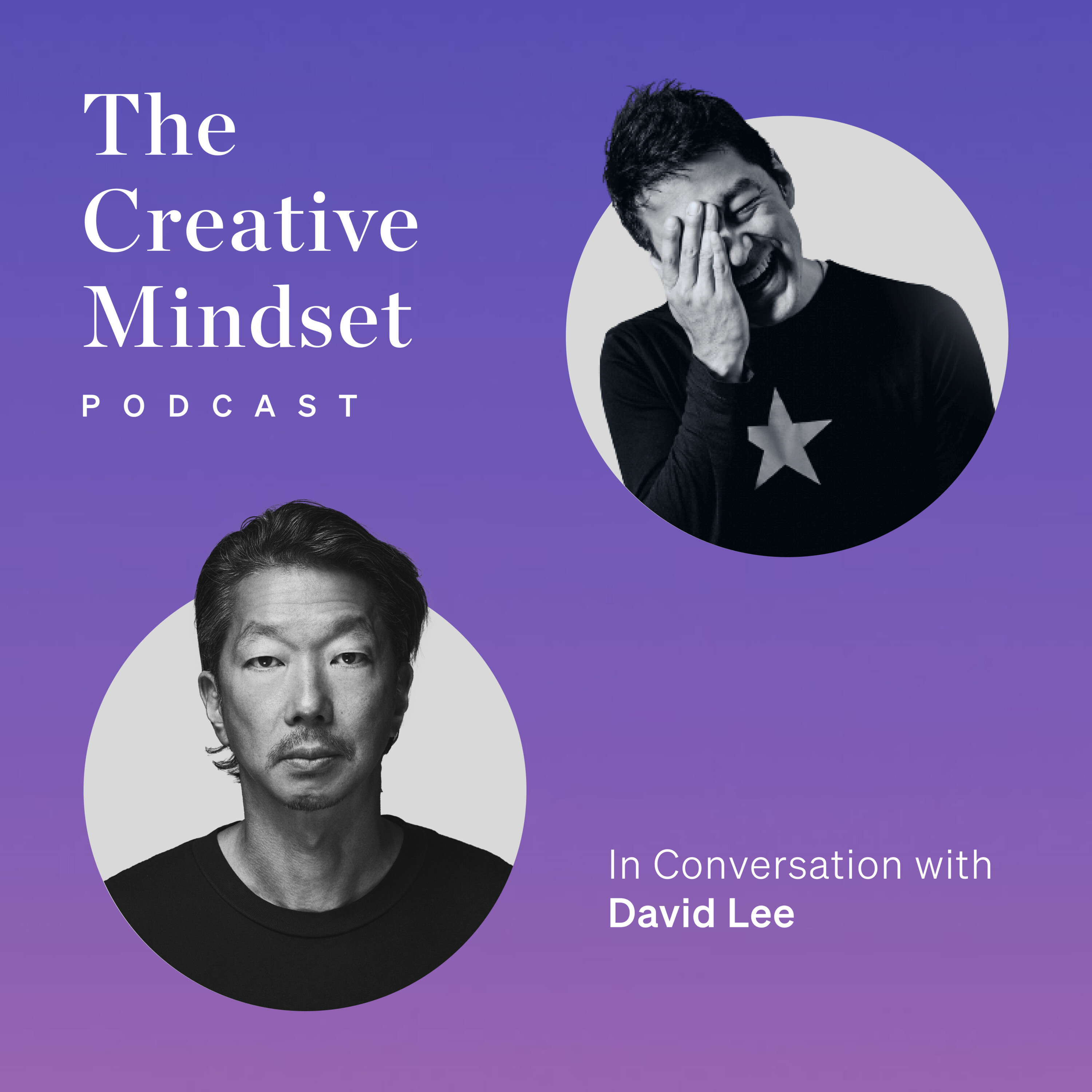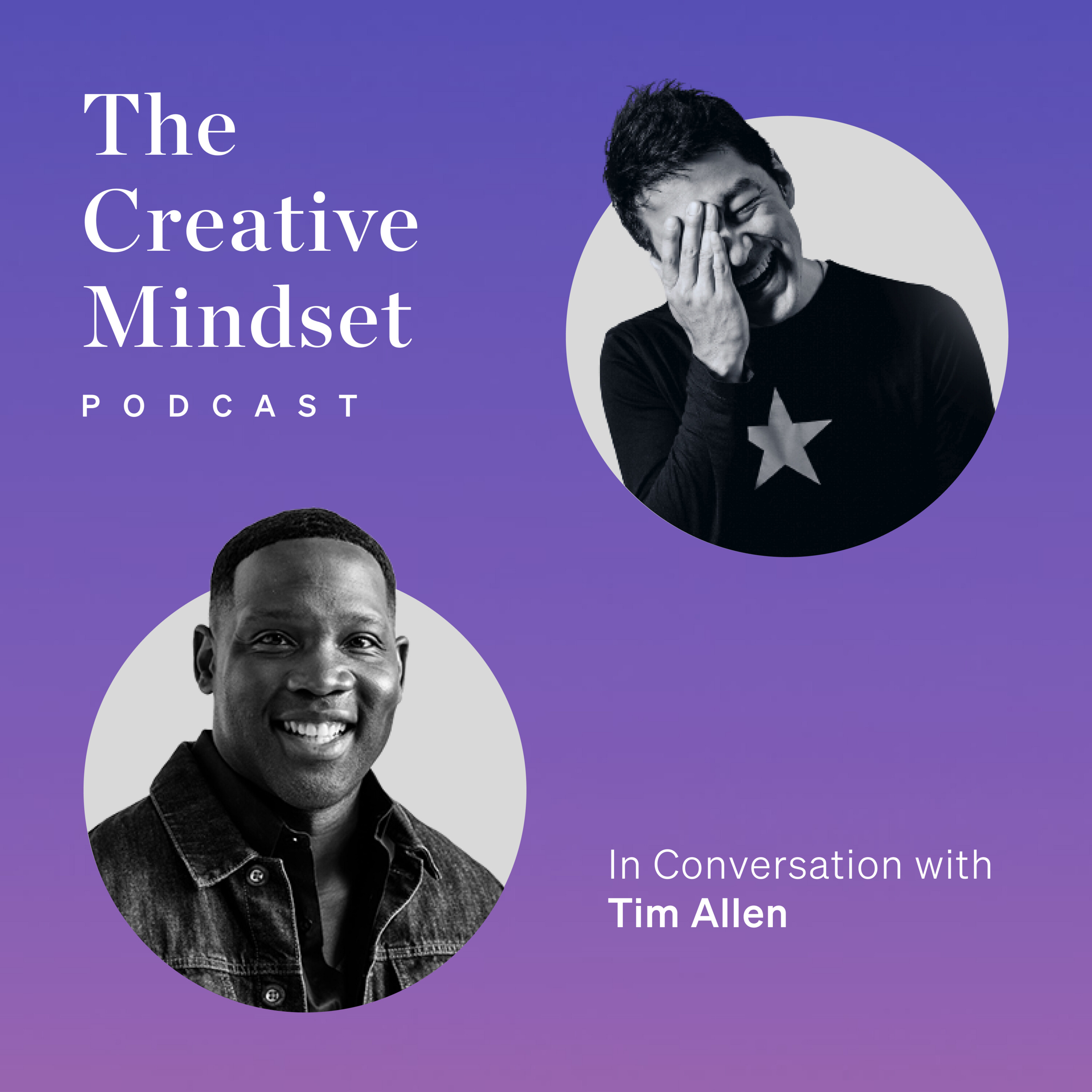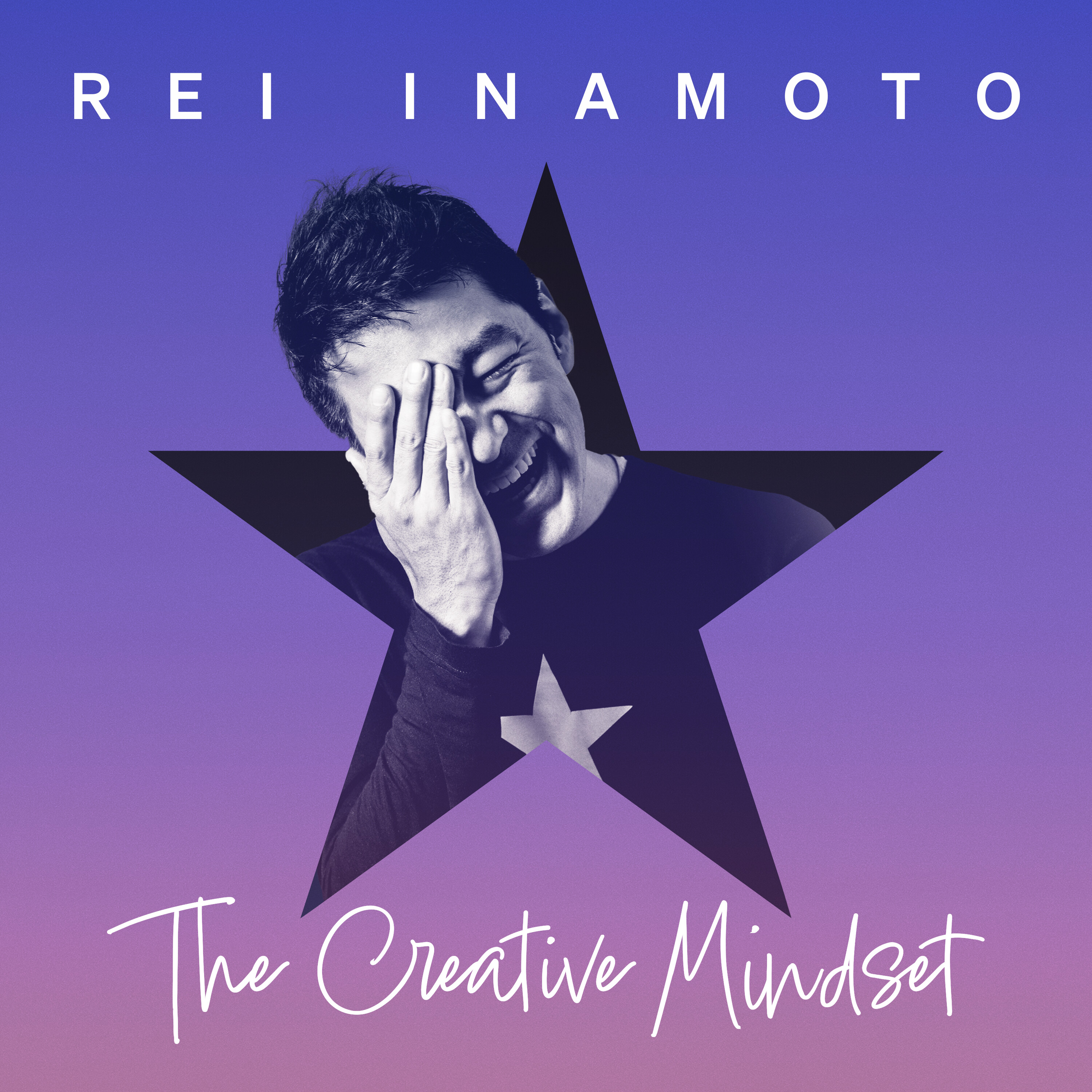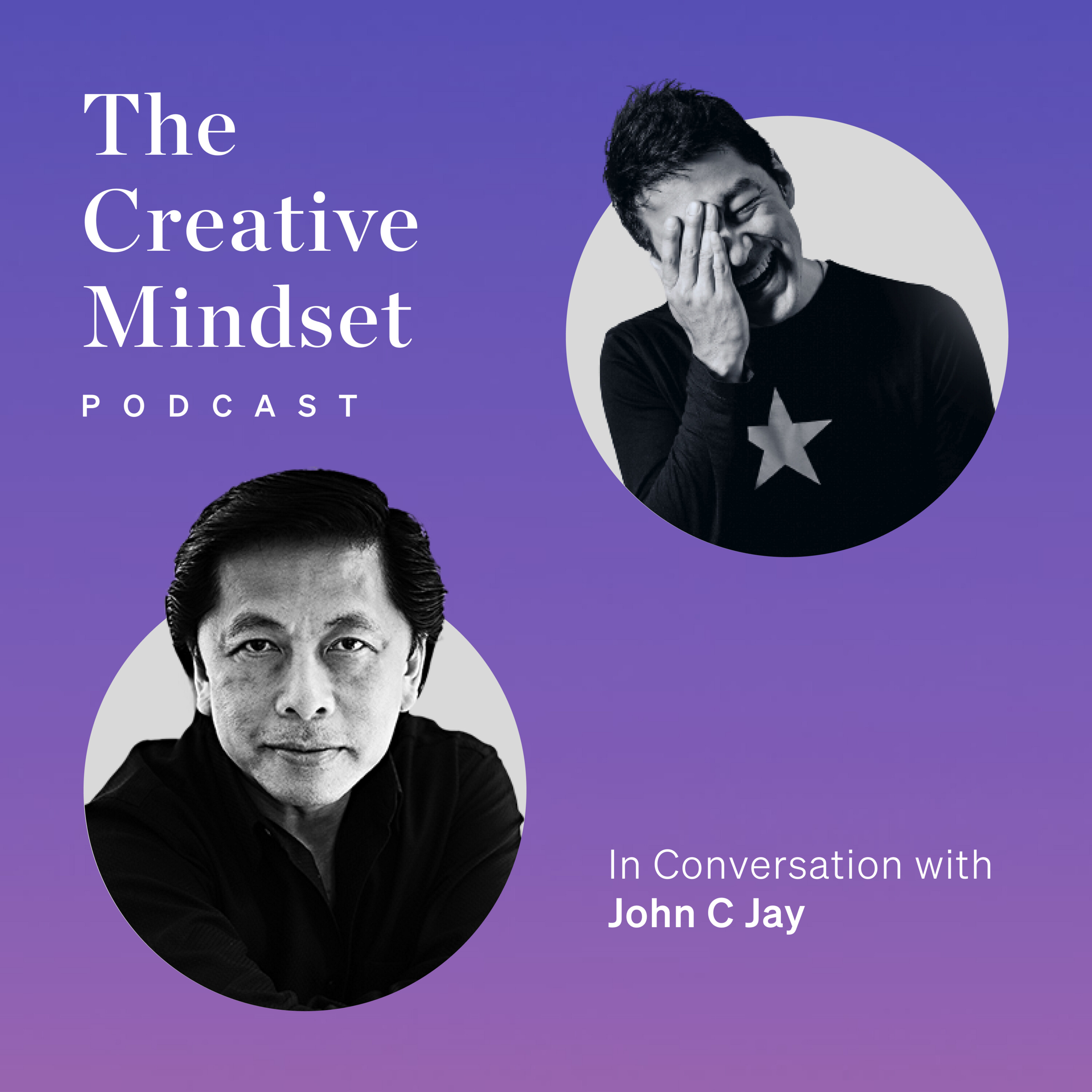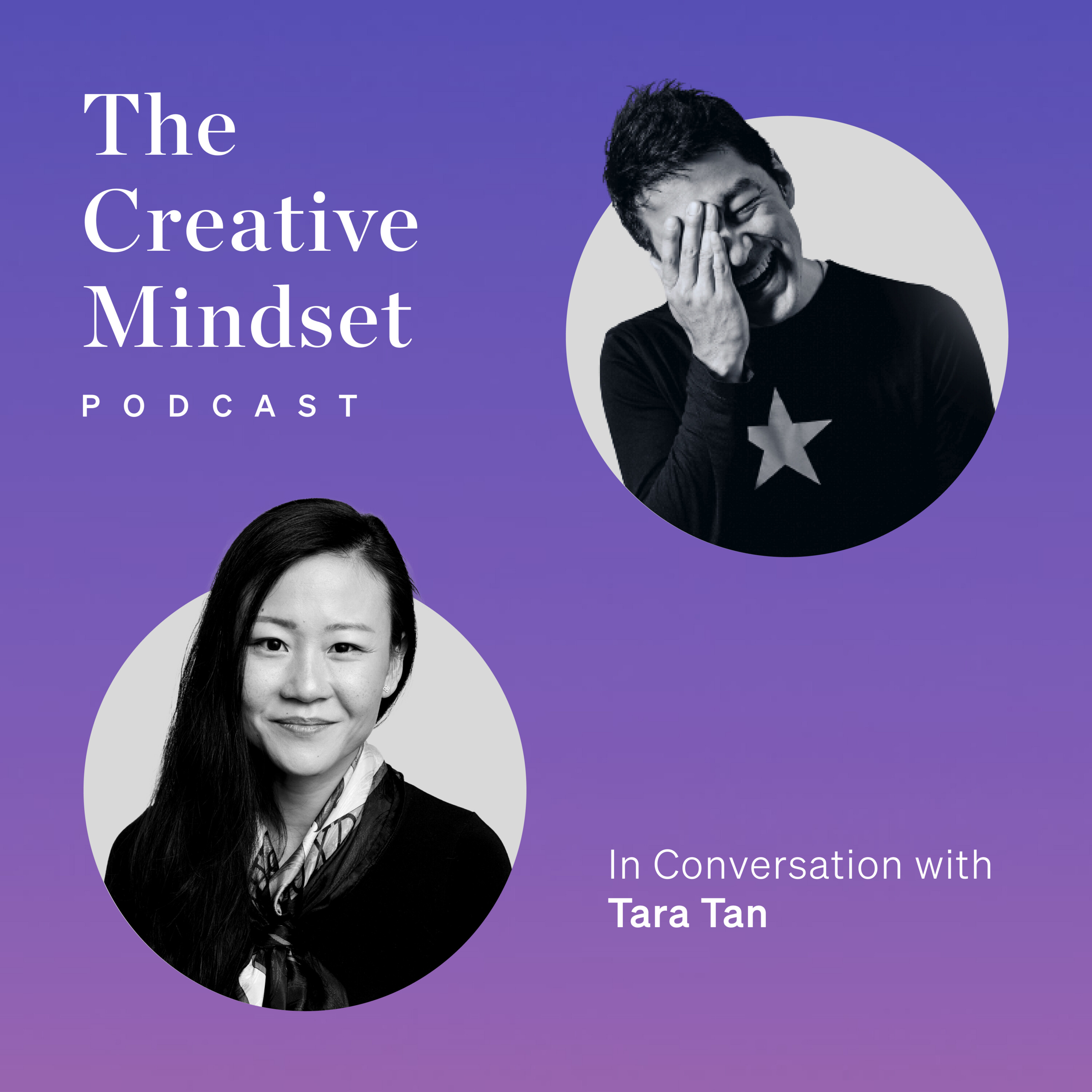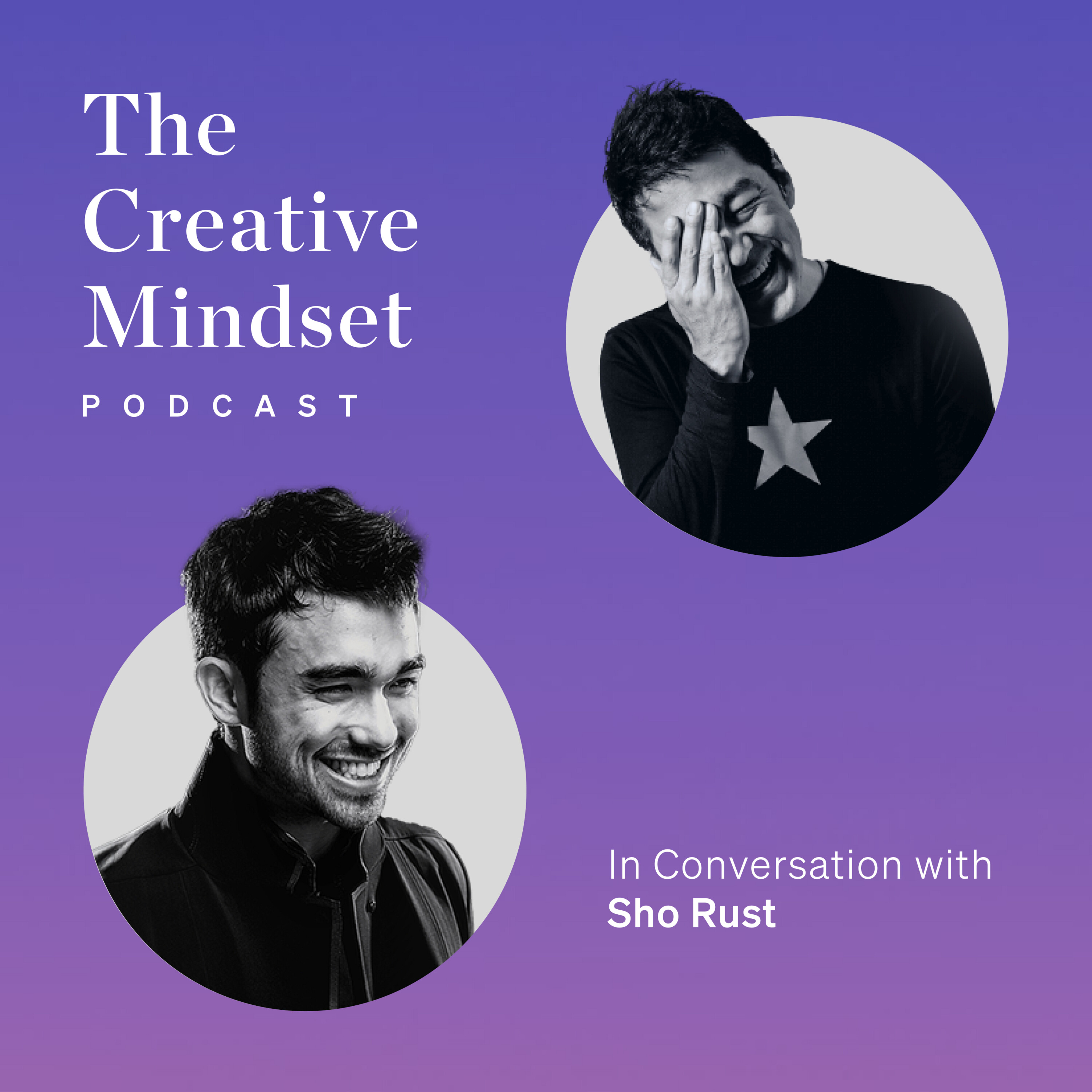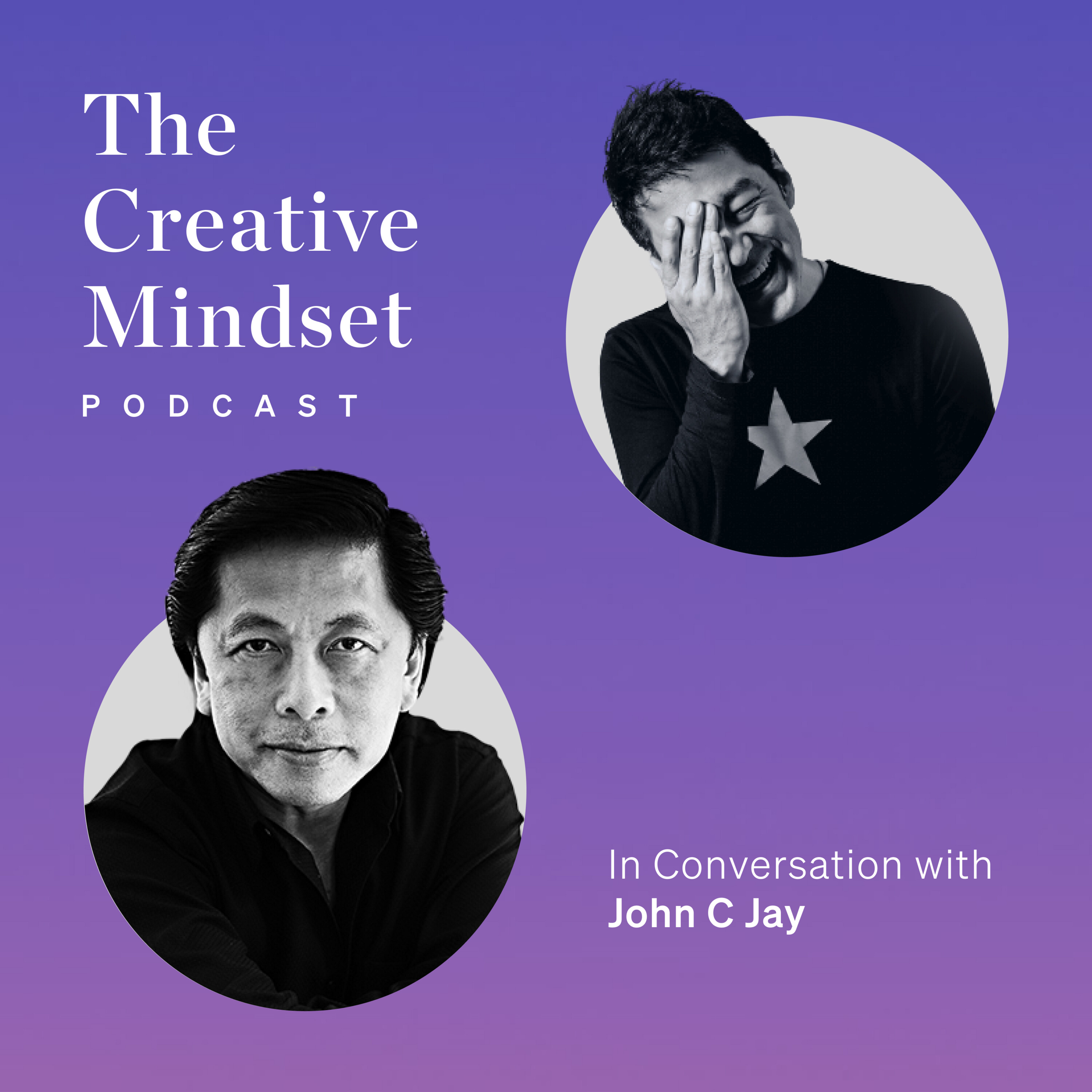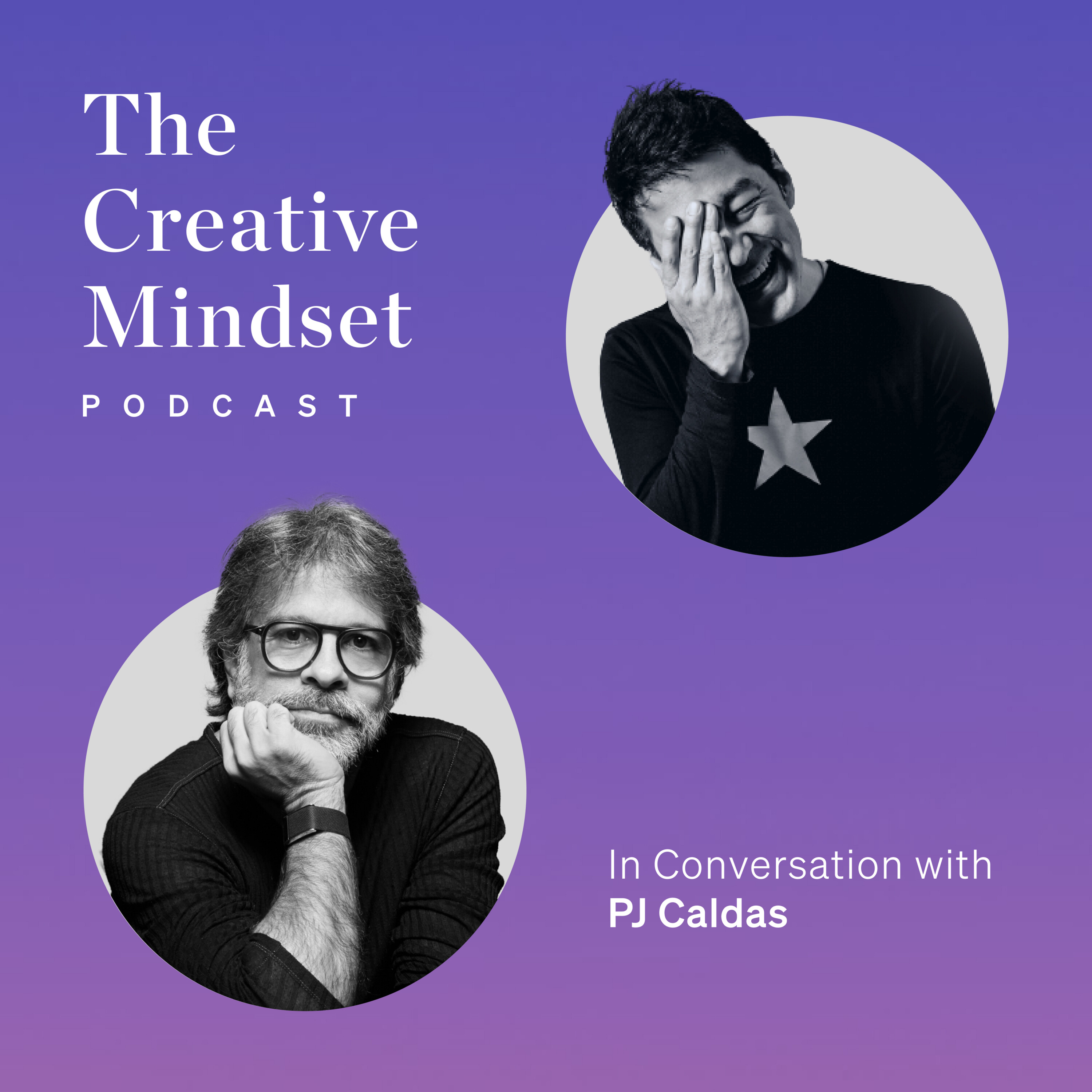This is Reinamoto's podcast, The Creative Mindset.
Hi everyone, welcome to The Creative Mindset, a podcast about what the future holds at the
intersection of creativity and technology. I am Reinamoto, the founding partner of I&CO,
a global innovation firm based in New York and Tokyo.
How can a creative professional have a meaningful impact on business?
This is another one of my questions that I explore and interrogate.
As a designer working business leaders in different sectors and countries,
this is an ongoing topic that I have to address over and over.
In addition to this, I see a lot of my creative colleagues struggle as the world around us keeps
changing. With the advancement of technology, the creative industries have become de-industrialized,
meaning those creative roles done by humans gradually get replaced by machines and algorithms.
The recent rise of AI doesn't help that current.
So one way for a creative professional to stay relevant is to become fluent in the language of
business. Today's guest is David Lee, the Chief Creative Officer of Squarespace, a New York-based
technology company that helps millions of customers around the world create websites
with ease and elegance. He is one of the few designers that have been able to use their
background as a designer and use it to his advantage to function as a leader in one of the
most successful technology companies in the U.S. In this episode, he shares his journey on becoming
the successful executive that he is in the context of his business and working very closely with the
CEO of Squarespace. He also shares his thoughts on why creativity is the only job left, whether
you are creative or not. He shares his past, including specifically how he and I met more than
15 years ago. I'm recording this episode right after Cannes Lions Festival Creativity. That was
actually where he and I met back in 2005. We had a few drinks. Eventually, I convinced David to join
the company that I was working for at the time in San Francisco. He will share the specifics of that
story as well. So, let's get started. And, you know, you and I come from a similar background. In fact,
we worked together for a little bit a long time ago, over, say, 15 years ago, if I remember
correctly. And I'm dating ourselves very quickly. And, you know, you've had a very successful career
in the creative industry, in the advertising industry, and you jump ship. You're one of the
first early ones to jump ship from the advertising marketing industry to the tech industry. But
having given a little bit about your background, you know, at least from what I know of you,
but if you could describe your role and what you do at Squarespace, that would be good. Let's get
started with that.
Sure. I'll try my best. Because it covers quite a broad cross-section, I would say.
Look, ultimately, I think the responsibility that I have and our team and our department
has at Squarespace is to be the brand guardians for the company. And what I mean by that is
we want to make sure that in every product touchpoint where people use our product every
single day, to every media touchpoint where people might encounter our brand,
that there's creative and design excellence horizontally across everything.
So in some ways, I like to consider our team as like the brand guardians to make sure that
everything that goes out is hopefully delightful, hopefully usable. And ultimately, you know,
if we're going to put out, you know, some marketing and communications out into the world,
we want it to be a reflection of who the company is and our brand, and we care about that deeply.
So a lot of it is being the brand police at the same time, I would say.
And when you say brand guardians, and I assume you mean in both in terms of branding and marketing,
but also the way the product is designed and how the product is conceived, that
is part of the brand, correct?
The brand is ultimately a culmination of all these micro elements that a company
puts out into the world, right? So it's how the company behaves. It's what your office looks like
in your headquarters to how the product feels and moves in the actual editor of our core product to
how we show up at something like a Super Bowl campaign.
But even at the same time, how we show up when we put out an email news blast to our customers,
I think, ultimately, the brand is really just a culmination of all those different touch points.
And I think, whilst my team used to oversee all the product design of Squarespace,
you know, we have a chief product officer now and a lot of the user experience
now falls under his jurisdiction, but our team is still
kind of sits at that intersection where we want to make sure that we're creating the best starting
points for our designs for our customers to make sure that they're starting on the best foot forward.
And all the most amazing stuff that we've done is a little bit of what I call Silicon Valley,
a little bit of Madison Avenue and a little bit of Hollywood, right?
So and I think the best work that I've seen is always kind of sits right at the
middle of that bent diagram. And that's the stuff that I'm interested in.
And I also think it's right at the intersection where your brand is actually created.
Yeah. I want to come back to the point that you just made about the intersection
of Silicon Valley, Hollywood and Madison Avenue. But before getting into that,
the role that you play as a chief creative officer at Squarespace and various creative
roles that you had prior to Squarespace, I mean, that was 10 years ago, but starting,
you know, your background is design, like my background, you know, you started as a designer,
but what was the journey and the trajectory of you growing up as a designer professionally?
And was there a key turning point for you to become a chief creative officer? And,
you know, what did it take for you to be so close to the CEO, the business side of a given business?
I think in order for me to answer that, I have to kind of rewind all the way back
to how I even started in this business. I think it actually started, like, look, I'm from Quebec
in Canada. So, I'm like a French Canadian, Korean. And, you know, for what it's worth,
I always wanted to be an artist. I kind of grew up in the 90s, in the skater scene, you know,
looking at Thrasher Magazine and looking at the artwork, like on the actual decks and stuff like
that. I got enveloped in like the whole street culture and the fashion and the, you know, the
marketing around things. And I think that for the first time I realized what the power of a brand was
even before I even knew what a brand was, right? And I think that is what catapulted me into design
school, right? I wanted to use my creative sensibilities and my infatuation with like
art and design, but I wanted to make sure I had a job at the end of the day.
So, graphic design seemed to be this perfect balance where you could get some creative
expression and visual expression out of it. But hopefully, I could be able to move out of my mom
and dad's basement one day and actually be able to have a career in something where
I could actually fend for myself. So, that's ultimately how I ended up, you know, applying
and going into design school. So, I ended up, you know, for what it's worth, I could have gotten a
great education in Canada. But I don't know, the grass is always greener on the other side. And
for me, that border, south of the border seemed to be like this promised land where lots of like
really interesting things were happening. So, I applied to these different schools and ended up
in the smallest state in the United States in this one of the very charming town of Providence,
Rhode Island and ended up going to a school called the Rhode Island School of Design or RISD
as the shorthand version of that. Which ironically, 23 years later, I'm now on the board of trustees
at my alma mater. So, that's a very full circle kind of moment back to kind of where it all began.
But I think, you know, it was during my time at RISD where, you know, I assumed there'd be like
some technical things that you're learning, there'd be some theoretical things, but it turns out the
actual program and the degree, there was no technical courses or what have you. It was really
what I think what I appreciated at RISD, which I only just realized decades later, what was the
value in it, is that they teach you how to think, right? And they teach you how to like critically
think about a problem and try and find like a visual solution to that. And I didn't really
understand it at that time. But ultimately, whether you're doing a piece of graphic design,
an ad, or something in a digital space, really, at the end of it, there's still a story that
you're trying to tell in almost all of those different examples that I've actually kind of
just spoke about. So it was only when I graduated from RISD, and this was in 2000, where I started
my career with like the advent of the internet and the web being like this blank canvas and
really creative medium. And I don't know, Ray, you must know this. But like back in the day,
like it was like the wild, wild west, people were doing like really amazing creative things
with the web, because it was this malleable space and no one really knew where it was going to go.
So I found that interesting. And I kind of just threw myself at that right out of school,
and ended up going to Hong Kong, right after graduating and almost took a sabbatical out of
before my career even started. And ended up back in Montreal, just to say hi to my parents
and my family. And someone said I should apply to this agency, which was a very progressive
agency, in the sense that in 2001, there were not a lot of agencies that were doing like a lot of
digital interactive work, and like big.com builds and things like that. But we're also
had such a progressive design culture, and identity, what have you, obviously did advertising,
but also did architecture, and did like interior design and all these different things.
And the reason why I mentioned this, I think that place actually had a really good impact
on my career, because you got to see horizontally across all these disciplines that are usually
quite siloed off. And for me, it was like going to school and getting except you're getting paid
at this time, right? And it was a great first step for me, because you got to
just touch a few things here and there. And I think when you're in your 20s, people you might think
you know who you are, you really don't, right? I mean, you might think you even know yourself in
your 30s, I would argue, you probably don't, right? Or even 40s. Who knows?
Who knows? You and I will probably be saying this when we're 75 years old, right? That we still
don't know each other, but yes, or ourselves. Yes. But I would argue that in the earlier parts
of my career, that variety, that horizontal breadth was actually really helpful. And I don't
know if this is interesting to your audience, but that's actually where I met you.
Yes. Yes.
Right. I went to a talk where you were giving a lecture when you were working at RGA. And I
remember being fascinated...
2004.
Oh, wow. Good memory. Good memory. I would never have been able to point out that year.
But I remember being kind of like eyes wide open, kind of like, wow, this is someone who's
working on brands like Nike, doing really amazing things with the World Wide Web, and really kind
of pushing the web forward. And for me, that was kind of like, at that moment in my career,
that was one of the most interesting, kind of like discipline that I was really kind of like,
I wanted to go deep, deep into. So when I saw your talk, I remember very clearly,
I went up to you afterwards. And I think I gave you my card. And I said, Hey, you don't know who
I am, but great talk. If you ever are looking for an art director or a designer, I would love to,
you consider me and I'd love to show you some of my work and stuff like that.
That's right.
For the audience out there, that's actually how I met Mr. Ray Inomoto.
That's right.
And then, lo and behold, I think, how long was it after that, that we kind of connected?
For some reason, you, I can't remember if it was you reaching out to me after that,
or I reaching out to you, but I had left the agency RGA. And even though you were interested
in RGA, I had moved on to AKQA. And then a few months later, we happened to be in the same town
at the same time, the famous town of Cannes, France. And we had a drink or two and I must have
gotten you drunk. And then that's how I convinced you to move to San Francisco to join me at AKQA.
Okay. So, I do remember it. I don't remember it exactly like that, but I'll take your word for
it. It was a long time ago. But I do, however, remember, I think I reached out to you.
Yeah.
And I think you were still there, but you basically said
you were about to leave to this other company and move into San Francisco.
Yeah.
And I had this fork in the road because I had two opportunities to go with your previous agency
and or to go with your new one.
Yeah.
And yeah, I guess you did convince me at the infamous Cannes
that I should take the leap of faith with you and follow you to San Francisco.
Right, right.
So, let's jump into what I would call the second chapter of my professional
career, which is with you, right? So, I think I wanted to really go deep into
interactive and build digital experiences. That was the thing after my first employment
right? And this was also... There was still the residue of the first dot com
bubble popping at that time, even though this was years and years later. I think that was...
I mean, this is the closest I got to actually Silicon Valley, right? And in terms of not only
that type of work that we were doing, but just in terms of proximity over there.
But so, I found that really valuable at that juncture in my career. I consider
you a mentor during that time. I still consider you a mentor right now. And now we're actually
good friends. So, that goes for something that was... It was more than 15 years ago.
That must have been like 17... No, it might even be longer. But I don't know. There's something
with me who's like... I'm like a sponge. I like absorbing as many different experiences in life,
because I feel like the more inputs you have, the better output you'll have, right?
And look, at that time, I had a partner and a girlfriend who wanted to move back to London,
England. And although I would say I wasn't ready to leave San Francisco,
it ended up being just something that... I did speed dating for 48 hours at different
agencies in London. And that was... The reason why I ended up in London is I decided to
hop over to the pond, go to a different continent,
a different country, a different city, and try something a little bit different,
I would say. So I ended up going to arguably pound for pound, one of the best,
kind of more like traditional creative agency, advertising agencies in the world in
Wyden Kennedy. And even though I was there to help them build more of an interactive
digital practice, because at that time, they did not really have anyone there.
So I got brought on as a creative director to try and help build some sort of like offering,
I would say. But during my almost three years there, it was... I got surrounded by so many
great storytellers, right? Some of the best storytellers that I've had the privilege to
work with, and ended up working on bits and bobs like other things outside of digital campaigns
and things like that. And I think that's where I really learned the art of storytelling,
I would say, and the appreciation of storytelling in that more linear kind of like format, right?
And I got infatuated by that, because it wasn't something that I was necessarily great at,
or I had a lot of experience in. I had dabbled, you know, in Montreal.
Some of the work, arguably, when we worked together was in that storytelling,
through that storytelling lens. But I think it was really when I got to London where
I really had an appreciation for that. Right. And then I would say, after three years later,
I ended up getting an opportunity to come to New York, which is where I originally wanted to go to
before you pulled me to San Francisco, where this was the opportunity at a much bigger scale.
So all of those different agencies were independents at that time. And this is the first
big holding company experience where I got brought on as a worldwide kind of executive
creative director, you know, like a 12,000 employee network, 250 offices, 10 regional hubs,
and it all intersected in Madison Avenue. Right. And I think this was probably the role and the job
where I learned the most, that surprisingly, had nothing to do with creativity. It almost feels like
this, this is where I got my MBA, the hard and real way. Right. This is where I saw how a 12,000
person network actually operated. Right. This is where I had to learn how to be how to pitch with
the best of them. This is where I was really on the front lines, pitching to global clients flying
around on the different, you know, the different continents, different cities all around the world
for over half the year. And I had to learn how to develop a muscle that I didn't really, really
muscle that I didn't really, really have. Right. So I would say that this is, this chapter is where
I learned a lot about like the strategic rigor and the importance of that, and the how words
really matter, and how you articulate yourself, and how you present yourself to the world is
really important, where I would argue that a lot of designers don't have that ability,
right, to be able to articulate a lot of the things that they're actually designing
in the best manner. And I had to like learn with the best of them. And then strangely enough,
you know, the agency and the holding company allowed me to create almost like a skunk works
R&D company, because I had this entrepreneurial itch to actually create some software.
And I actually created something almost by accident, which ended up being the real catalyst
on how I ended up at Squarespace. Right. So this was something where I basically created,
you know, one of the insights that I learned is that for a network that big,
every one of their websites were completely different. Right? There was no, there was no
consistency, right? They couldn't even get the right Pantone color, right of the actual logo.
Like that's how, when you get to be that large, it's really hard to keep the quality control,
I would say, right. And instead of creating a global flagship website for the network,
I ended up pitching this idea of like, let's create this really rudimentary content management
system, and create a website where anyone else in the network could be able to use as well,
if they wanted to, instead of just doing like a one off. And ultimately, that's what we did.
And overnight, I think over two thirds of the entire network decided to use this,
which was more than I expected, number one. And then the transition after that was,
we then realized that a lot of how agencies present work out into the world, it's almost like,
it's like a PowerPoint, right? It's like, they like presenting things in a linear order.
So we actually decided to almost pivot the actual product that we made to more of a storytelling
platform rather than a website maker, right? To then be able to bring different real time data
things into this storytelling engine that we've created to kind of create rich multimedia,
real time presentations that actually had a heartbeat to it, right? So because you're
bringing in things from Twitter, you're bringing in things from X, Y, and Z.
And that's when it really took off. And I think we had over 100,000 users,
we actually then decided, we're going to launch this out to the general public,
and see if people even use that. And surprisingly, it did. And it ended up winning
one of the best educational products of the year at South by 2012. And the reason why I'm telling
you the story is that that's where I got the real entrepreneurial itch was at that juncture,
like that moment right there was when not only did I get the real entrepreneurial itch, but I
started to have this feeling of wanting to find a little bit more purpose in the work that I was
doing. And what I mean by that is that I wouldn't have changed anything of my previous jobs, or in
the early parts of my career, because I think agencies are a great way to learn and to figure
out what what is your real passion, because you get to work on such a varied amount of projects,
you get to live vicariously through different clients, their problems, and like what have you,
and you get to be like a firefighter and put out fires and come up with, you know, it's exciting.
But one day you wake up, and you realize that, you know, without pinpointing any,
any one client, you realize that the bulk of the clients you're working on,
you don't really care too much about, to be completely fair. Let's, let's just leave it at
that. And, you know, this just as much as I do. You spend so much time at work, right? And some
would argue, you spend more times at work, or thinking about work than you do even with your
family, right? And I'm not saying that's a, that's a good thing. But at least, at least in maybe our
generation, that that's what it just ended up being. And I started to have this epiphany of
well, if I'm going to do this for the next 10 years, I better really care about what the brand
or the clients or the thing that I'm going to do. So, I think that combined with my entrepreneurial
endeavor and an itch was the reason that ultimately got me to Squarespace.
Mm-hmm. You know, creativity is such a broad, vague word that is not well-defined depending
on who you ask. So, how would you define creativity and what do you mean by creativity
is the only job left? So, the reason why I believe creativity is the only job left
is for this reason and for this reason only. In 2023, this is my firm belief.
Like logic is actually really easy to automate, especially when everyone has access to the world's
knowledge base right now, right? And things like data analysis, research are actually much better
done by machines. They're going to be better at it, they're going to be quicker at it and what
have you. However, imagination, that's really a hard thing to replicate, right? And I think
creativity, emotional intelligence, right? These are things that are innate in humans,
right? And when I say creative and creativity, I don't just specifically mean people who have
been labeled as creatives because of the industry and the job that we actually have because I
actually believe humans by nature are creative beings, right? People are coming up with ideas
all the time, right? The problem is that most people don't know what to do with that idea in
their head and to actually make that into something tangible and real. But with all the slew
of tools that are coming out right now that are really easy to rapid prototype out or to quickly
validate an idea, I think what we're going to see is that a lot more people are going to have to
move upstream because a lot of the repetitive jobs, right? And a lot of the production-based
jobs, right? I wouldn't say will be completely automated away, but they're going to have to
evolve from where they are right now. Because when a machine can code better than it can code,
than humans can code, when it can do production design better than certain production designers
and what have you, when it can write better than a lot of writers can, right? We have to kind of
move upstream. But what I think is going to be the future of where, because I believe trends
will always still be dictated by humans, right? Is that that grammatically incorrect way of saying
something, which is actually quite charming, there's going to be a huge value add to that,
right? Or the little imperfection on something or even like the mistake, right? Because machines
are really good at analyzing patterns, humans are much better at breaking the pattern and finding
like the break, like in the pattern. But I believe that there's going to be a huge impetus put,
and a huge value put on things that have some human intervention. And you're clearly going to
see what is machine made and machine thought versus what is human made. And the reason why I
say this is that it's almost like human craft is actually the new luxury, again, right? The luxury
brands have always been that way, right? Everything's like handmade, you want to make sure
that because there's a story attached to it, right? Of that, you know, that place in Italy,
that's like, you know, hand stamping something and hand sewing. And like, there's a story kind
of like attached to that, right? And there's little imperfections, it's not perfect, right?
So, things that are not perfect, they're going to be a huge value add towards, right? So, I actually
feel what's old is going to be new again. And ironically, people who are using their hands,
right, who are actually making things, right, that aren't perfect, that have that little stamp of
human intervention, those are going to be the most valuable things in the future, right? Because
everything's going to start looking the same, right? I would also argue that just because
Midjourney can create an image that looks great, or ChatGPT can write something
that's actually quite intellectual and very grammatically correct, you still need references,
right? You need to have references of like, what are you actually putting into a prompt,
right? If you don't have the references, you're not going to output anything interesting from
any of these pieces of software because that's really what it is, right? You have to understand
I'm trying to reference this photographer from the past, right? Or you want to reference this writer
from the past over here. If you don't actually understand that, right, and you don't have those
references, there's nothing you're gonna be able to put in there that's going to be anything
interesting on the way out, which is why, again, you need better inputs to have better outputs,
right? So I would argue humans need to go upstream and that every job that we do in every
job, or every discipline are going to be creative jobs. So again, just to be clear,
not just our business, in every job, right? You don't have to be a creative to be a creative.
Yeah, humans are creative in nature. You just got to unlock that muscle at this point and we have
humanity has to move upstream, not downstream. Because I think the downstream stuff is where
there's going to be a lot of automation kind of like happening right now, right? So this is what
I tell everyone, you know, is that I really do believe creativity is the only job left,
but you don't have to be a creative to be creative, right? So but you have to live life,
you have to experience things, you have to because it's really, it's still about ideas,
and it's still you have to live a very rich life to be able to pull in the right inputs
to have a better output. I don't think creativity is design. I don't think creativity is copywriting,
or, so let's just make that clear. I do not think that is creativity. I think creativity
is about coming up with unique ideas to solve a problem. And what I would say is that in every
industry, in every sector, in every category, in every job, in every discipline or department,
that is the most valuable thing that humans can bring in a world where there's going to be a lot
of jobs automated away. And there will be lots of machine learning, and things that will be able to
do things much quicker and better than humans. I would argue, everyone has to go kind of like
upstream, and it has nothing to do with design. It has nothing to do with art direction,
or copywriting, or any of that, right? Because I would argue this, I consider this the next golden
age of humanity. I don't believe anyone wants to work at McDonald's. I believe that that's a choice
for certain people, because there's a lot of career paths that were not accessible to them,
for which other reason. But I would argue that today, with all these large language models and
all these tools available, just learn them. Because I don't think you have to be a certain
age to learn these things. I don't think you have to be, just put yourself out there and learn.
You can have an education on YouTube today, if you're a creatively curious person. I don't
believe you need to go to Harvard to get a certain type of education today. Yes, there are values of
that education like that. But the world is going to move on without us. There'll be innovations
that keep coming on, no matter what. It's everyone's job to adapt and to use them to your
advantage. Right? And I think you could be a kid today and come up with an idea and validate it
very quickly. And you may never even have to go to school. I don't care where you are in the world.
Right? And I think that's a beautiful thing. It's a little bit of like the equalizer.
So the difference is going to be in the creative expression and the creative ideas of what these
businesses are, etc, what have you. So that's the way that I can answer it through my lens.
I realized that the tone of this conversation sounded somewhat serious, but I've known David
for close to 20 years now. And one, the listeners can't see this. At the beginning of the recording
of this conversation, he was wearing a hoodie. And he asked us whether we were recording the video
portion of this conversation. And we said, yes. And he immediately said, let me change to something
else. And when he came back, he came back with a black T-shirt, which in my mind wasn't drastically
different from a black hoodie. But I guess that also speaks to his particular focus on how he
presents himself and as a creative individual. He talked about being the guardian, the brand
guardian of Squarespace. But just the fact that he took 30 seconds to change his hoodie to a T-shirt
also spoke to his peculiar focus and taste as an individual. So that, although you can't see this
through this podcast, but I thought I would share that little anecdote with David.
This was part one of my conversation with David Lee, the chief creative officer of Squarespace.
I really wanted to ask him how can a creative professional have a meaningful impact on
business. And he shared a few insights and his advice on not just creatives, but individuals
trying to stay relevant in this increasingly automated age of AI and machines. The three
takeaways, number one, human craft is the new luxury. Number two, designers and creatives
move upstream. Key takeaway number three, creativity is the only job left. The first key takeaway,
human craft is a new luxury. The language that he used when talking about this is what's old is
going to be new. Because any task that can be repeated, he says, and I've heard other people
say a similar thing as well, anything that can be repeated is going to be automated by machines,
if not now, eventually. If you're doing a similar task day in, day out, that you need to watch out.
In the traditional sense, let's say fashion, there are a lot of luxury companies that are
handmade, that are handcrafted, and therefore those products have more value, more premium.
And another thing that he mentioned when describing this was that they have more story
to tell behind each handcrafted items. Moving forward, it's not just about physical objects,
but digital things as well. By having that or adding that human touch, human craft is going to
make that thing more valuable than other things that have been automatically made by machines.
So point number one, human craft is a new luxury. Number two, designers and creatives move upstream.
My conversation with David, almost more so than anybody else, he was very clear about what he took
away from each step of his academic and professional career, whether learning design at
RISD, where he says he wasn't necessarily taught technical skills, but he was taught how to think,
which by the way, is exactly what another one of my guests, John Jay, said about his college
training. It was about thinking critically about the problem at hand, and really understanding
what is the problem as opposed to what is the answer. To the job that he had right after college
to lead, to moving to London, going to a big international network, and then eventually
landing his role as the chief creative officer 10 years ago at a tech company. And he was very crisp
about the learnings that he's had, but the specific takeaway for creatives and designers
who are the makers of things, hey, we need to move upstream in order to have a meaningful
impact on business and being close to the decision makers. Key takeaway number three,
creativity is the only job left. And this was towards the end of my conversation in part one,
and he will talk more about this in the next episode as well, but he doesn't necessarily
use the word creativity specifically reserved for creatives and designers. Everybody has the ability
and the responsibility to think creatively and moving forward, especially because AI is
increasingly going to automate things that, tasks that can be repeated, thinking critically
and thinking creatively about the situation that you are in, about the challenge that you have,
about the problem that you're trying to solve in order to get ahead. And going back to my first
point, having that human touch to twist and make it into something great. And that is the job of
creatives. And more importantly, thinking creatively and having creativity as part of
your arsenal in business. The three takeaways, number one, human craft is the new luxury.
